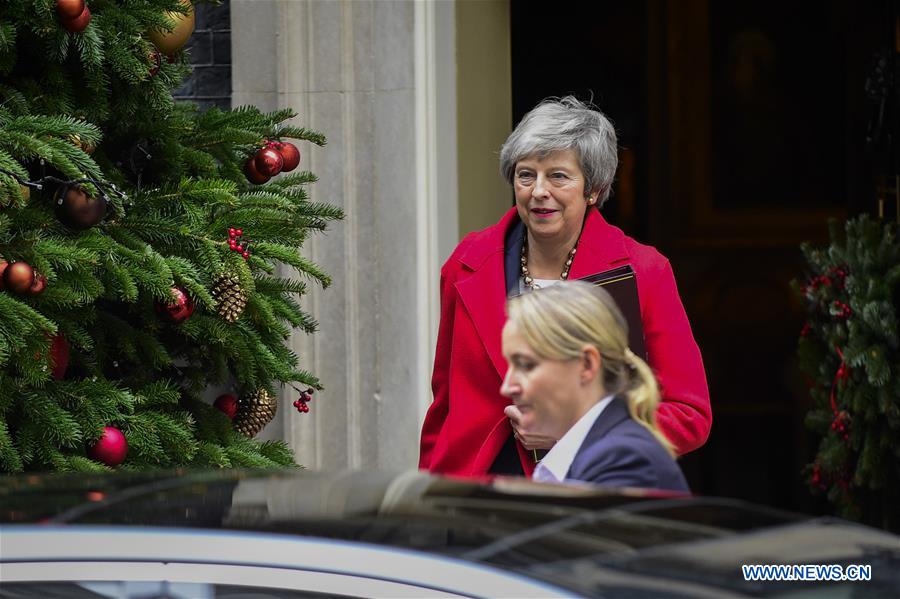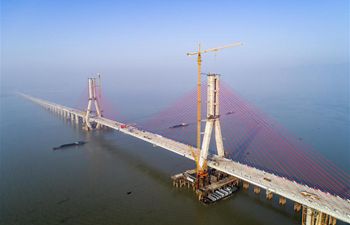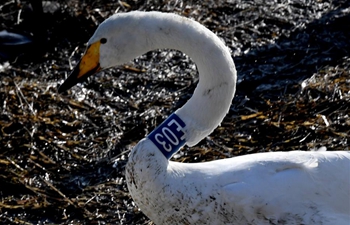
British Prime Minister Theresa May (Rear) leaves 10 Downing Street in London, Britain, on Dec. 4, 2018. British MPs on Tuesday voted by 311 to 293 to find ministers in contempt of parliament over their failure to publish the full legal advice on the Brexit deal. (Xinhua/Stephen Chung)
LONDON, Dec. 4 (Xinhua) -- British Prime Minister Theresa May said the five day Brexit debate which started Tuesday evening in the House of Commons will set the course Britain takes for decades to come.
The historic chamber was crammed with lawmakers in what has been described as one of the most crucial debates in a generation in British politics.
Next Tuesday MPs will vote on whether to support or reject a deal agreed between May's government and the European Union on Britain's future relationship with Brussels.
The start of the Brexit debate was delayed for hours after Speaker of the House John Bercow allowed MPs to discuss whether May's government was in contempt of parliament. MPs said the contempt arose because the government refused an order from the House of Commons to publish the full legal advice on the Brexit deal from Attorney General Geoffrey Cox.
In what was a rare procedure in the British Houses of Parliament, by a vote of 311 to 283, MPs decided the government was in contempt.
Leader of the House Andrea Leadsom said the full advice would now be published by the government on Wednesday.
MPs want to read the full document to see the precise advice given by Cox on the arrangements over the border between Northern Ireland and the Irish Republic, which will continue to be an EU member after Britain leaves the bloc next March.
Sir Keir Starmer, Labour's main Brexit spokesman, said later: "Today's finding of contempt is a badge of shame for this government. It is of huge constitutional and political significance. Never before has the House of Commons found Ministers in contempt of Parliament. Ministers left the opposition with no option but to bring forward these proceedings."
May said in her opening statement that the Brexit debate had been corrosive to politics in Britain.
She said Britain had joined what was the EEC at its third attempt in 1973, and two years later there was a referendum in which a third of the people said they wanted to leave.
In the 2016 referendum the majority of people voted that it wanted to leave the EU, and now the government was honoring that decision of the people.
She added: "What I believe is important is that we respect the views of those who voted leave and deliver Brexit. We also recognise that we do need to protect the trading relationship and ensure that we protect the jobs that rely on that trading relationship."
May told how she had spent nearly two years negotiating the Brexit deal, adding: "I have lost valued colleagues along the way and faced fierce criticism from all sides."
Jeremy Corbyn, leader of the main opposition Labour Party said May's deal would leave Britain over a barrel.
He said that under the deal, Britain would face, at the end of a Brexit implementation period in December 2020, a choice of either paying more and extend the transition period or fall into the backstop arrangement over the Irish border.
"At that point Britain would be over a barrel," said Corbyn, adding that Britain would have to abide by EU rules.
"Under the Prime Minister's deal the UK is not taking back control, it is losing control," said Corbyn.
Corbyn, who favors a general election to decide the Brexit issue, said if the government loses the vote on December 11 it will have lost the confidence of the House of Commons.
He told MPs: "There isn't a deal, there is a framework for the partnership, a blindfold Brexit and MPs won't vote for a leap in the dark," he said, adding that May's agreement it's a bridge to nowhere.
Corbyn said there was an alternative to May's Brexit, saying Labour will vote against what is a bad deal for the country.
Vince Cable, leader of the minority Liberal Democrats, said the credibility of May's deal is evaporating
"This is now a Government on the ropes," said Cable, adding that May's majority has evaporated, and the credibility of her deal is evaporating with it."
Cable added: "The House of Commons is now very likely to defeat the government next week on the Brexit deal, at which point the country must be given a People's Vote, and asked to choose between the deal or remaining in the EU."
Nigel Dodds, the deputy leader of the Democratic Unionist Party (DUP) said his party does not fear the prospect of a snap general election.
May's minority government relies on support from the 10 DUP MPs at Westminster to give her a majority.
So far the DUP has said it will vote against May's deal.
Former Foreign Secretary Boris Johnson, who quit in protest at May's Brexit deal, said he hopes the House of Commons will vote against the deal next week.
Johnson said: "Now is the time, thinking about the EU's attitude towards us, to say they have underestimated this country and government."











